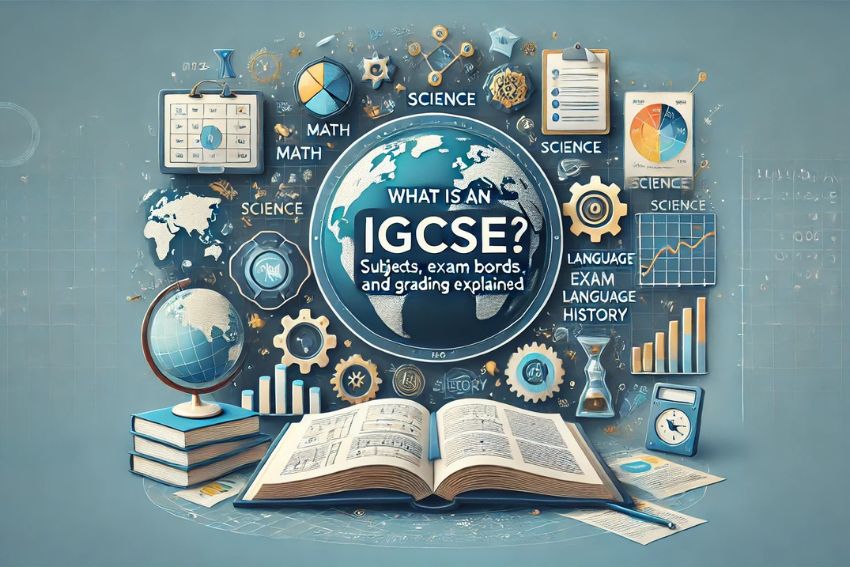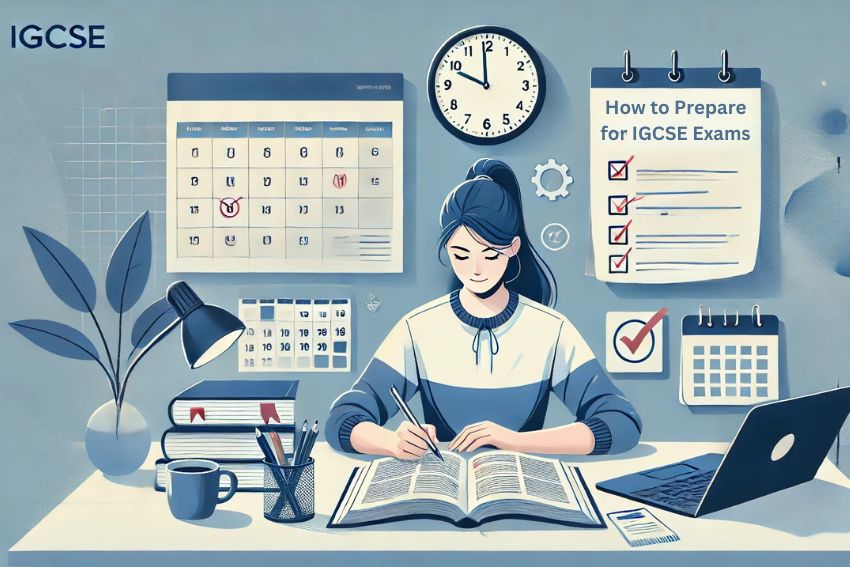What is an IGCSE? -IGCSE stands for International General Certificate of Secondary Education. It is a globally recognised qualification designed for secondary school students. Many parents wonder if the International GCSE is different from standard qualifications like the GCSE. The answer is yes—it follows an international curriculum that prepares students for further education, such as A-Levels or the IB Diploma.
Students receive the IGCSE certificate after completing their exams, proving their academic achievements. Universities, employers, and education systems worldwide recognise it, making it a popular choice for international school and homeschooling students. Several IGCSE exam boards, including Cambridge (CAIE), Edexcel, and Oxford AQA, offer this qualification, each with slightly different syllabuses and assessment methods.
Because of its flexibility and international focus, the IGCSE is widely chosen by students who need a qualification that is accepted globally and tailored to different learning needs. In this guide, you’ll discover what is an IGCSE, how it differs from GCSEs, and why it’s a great option for students worldwide. You’ll also learn about IGCSE exam boards, the structure of the qualification, its benefits, and how students can prepare for it.
So, whether you’re already enrolled in the programme or just considering it, keep reading to find out everything you need to know to succeed in your IGCSEs!

What is an IGCSE? History and Development
So, what is an IGCSE and how it was evolved? The IGCSE was introduced by Cambridge Assessment International Education (CAIE) in 1988. It was designed as an alternative to the UK’s GCSE, offering a curriculum that could be used in schools across different countries. Unlike local education systems, which follow country-specific standards, the International GCSE provides a more flexible and globally relevant qualification.
Over the years, IGCSEs have gained recognition worldwide. Many international schools, private institutions, and homeschooling programs offer this qualification, making it one of the most widely accepted secondary education certifications. Today, several IGCSE exam boards, including Cambridge (CAIE), Edexcel, and Oxford AQA, provide slightly different versions of the qualification, allowing schools to choose the curriculum that best suits their students.
One of the key reasons for the IGCSE’s global adoption is its adaptability. Unlike national curriculums tailored to specific countries, the IGCSE focuses on international accessibility. It supports students from diverse cultural and academic backgrounds, ensuring they receive a high-quality education recognised by universities and employers worldwide.
IGCSE Subjects, Exam Boards, and Grading Explained
The International GCSE (IGCSE) offers a broad and flexible curriculum, allowing students to choose subjects based on their strengths and future goals. The grading system and exam structure vary slightly depending on the IGCSE exam boards, but all follow a standard approach to assessment.
IGCSE Subjects: Core and Optional Choices
One of the key benefits of the IGCSE is the wide range of subjects available. Unlike some national curriculums, IGCSE subjects allow students to tailor their studies to their interests and future career paths. While the IGCSE offers its own unique curriculum, students often consider subject difficulty when making their selections, just as they might when choosing easiest GCSE subjects in the standard qualification path.
Most students take compulsory subjects, which typically include:
Core IGCSE Subjects
| Core IGCSE Subjects |
| Mathematics |
| English Language |
| Science (Physics, Chemistry, and Biology) |
Beyond the core subjects, students can choose from a variety of optional subjects, including:
Optional IGCSE Subjects
| Optional IGCSE Subjects |
| Humanities (History, Geography, Global Perspectives) |
| Languages (French, Spanish, German, Mandarin, etc.) |
| Creative Arts (Music, Drama, Art & Design) |
| Business and Technology (Economics, Business Studies, ICT, Computer Science) |
Because IGCSEs have international recognition, they offer subject combinations that align with various education systems and career paths. This flexibility makes the international GCSE a popular choice for students who plan to continue their studies in different countries. IGCSE Maths is particularly important as it’s required for most higher education paths.
IGCSE Exam Boards: Cambridge, Edexcel & Oxford AQA
There are several IGCSE exam boards, with the most recognised being:
Cambridge IGCSE (CAIE) – The most widely used international GCSE, known for its broad subject range.
Edexcel IGCSE – A UK-based qualification with a focus on real-world application of knowledge.
Oxford AQA IGCSE – Designed to provide a balanced international education with structured assessments.
Each exam board follows the same core IGCSE structure, but their syllabuses and assessment styles differ slightly. For example, Cambridge and Oxford AQA offer more coursework-based options, while Edexcel has a strong focus on final exams.
IGCSE Grading System: 9-1 vs. A-G*
The IGCSE grade boundaries depends on the exam board. Some boards use the traditional A-G grading*, others have adopted the newer 9-1 grading system used in UK GCSEs.
Cambridge IGCSE – Offers both A*-G and 9-1 grading, depending on the school’s preference.
Edexcel IGCSE – Uses the 9-1 grading scale, aligning with UK GCSEs.
Oxford AQA IGCSE – Also follows the 9-1 grading system.
Understanding the IGCSE structure, subjects, and grading system helps parents and students make informed decisions when selecting the best IGCSE exam board and subject combinations.

What is an IGCSE and How It Differs from GCSE?
Many parents wonder about the difference between an IGCSE and a GCSE. Both qualifications are widely recognised, but they follow different structures and assessment styles. While GCSEs are primarily used in the UK, IGCSEs are designed for international students and schools worldwide. Understanding their IGCSE vs GCSE differences will help you decide which option is best for your child.
IGCSE vs GCSE: Curriculum Differences
One of the biggest differences between IGCSE and GCSE is the curriculum focus.
- IGCSE follows an international curriculum, making it suitable for students in different countries. It avoids UK-specific content, focusing instead on globally relevant topics.
- GCSE follows the UK National Curriculum, meaning it includes content tailored for students studying in England, Wales, and Northern Ireland.
Another key distinction is that IGCSE subjects are available in core and extended tiers, allowing students to choose a level that matches their ability. GCSE subjects, however, have a single-tier structure for most subjects.
Since the IGCSE has a worldwide recognition, students who plan to study abroad or attend an international school may find it more beneficial than GCSEs.
IGCSE vs GCSE: Assessment and Exam Style
IGCSE and GCSE assess students in different ways.
- GCSE exams often include coursework or controlled assessments, where students complete assignments during the school year.
- IGCSE exams are mostly exam-based, though some subjects allow coursework as an optional component.
Another key factor is exam boards. IGCSE exams are offered by Cambridge (CAIE), Edexcel, and Oxford AQA, while GCSEs are regulated by AQA, OCR, Edexcel, and WJEC. Although both qualifications require strong subject knowledge, IGCSE exams tend to focus more on application and analytical skills.
Because IGCSE assessments do not include as much coursework, students need to perform well in their final exams to achieve high grades.
What is an IGCSE and Why Is It Important?
Many parents wonder, “What is an IGCSE, and why is it important for my child?”The IGCSE certificate opens doors to higher education and career opportunities with its global recognition. Understanding what an IGCSE offers can help you make informed decisions about your child’s education.
Why Choose IGCSE?
One of the key benefits of the International GCSE is its global acceptance. Universities and employers worldwide recognise IGCSE exams as proof of academic achievement. This makes them an excellent choice for students who may study or work in different countries.
Another advantage is flexibility in subject choices. Students can select from a wide range of subjects, allowing them to focus on their strengths and future career goals. Unlike some education systems that have rigid subject requirements, IGCSE exams provide students with the freedom to customise their learning path.
The IGCSE certificate also provides a strong foundation for further education, including A-Levels, IB, or other advanced qualifications. If you’re comparing IGCSE vs GCSE, it’s important to know that IGCSE includes both exam-based and coursework-based assessments, allowing students to choose the approach that suits them best.
Thus, IGCSE certificate serves as proof of academic achievement for university applications, jobs, and scholarships. The International GCSE offers global recognition, flexible subject choices, and strong preparation for higher education.
What is an IGCSE? Who Can Take It and How to Enroll?
Many parents ask, “What is an IGCSE, and who can take it?” The International GCSE (IGCSE) is designed for students worldwide, offering a flexible pathway to higher education. Whether your child studies in a school, as a private candidate, or through homeschooling, they can sit for IGCSE exams and earn an IGCSE certificate. Unlike some national qualifications, IGCSEs are open to a wide range of students. Here’s who can take them:
- School Students – Most students take IGCSE exams through their school, which is registered with an IGCSE exam board like Cambridge, Edexcel, or Oxford AQA.
- Private Candidates – Students who don’t attend a school that offers IGCSEs can register independently at an approved exam centre.
- Homeschoolers – Many homeschooling families choose IGCSEs because of their flexible learning approach and international recognition. Parents or tutors guide the learning, and students sit for exams at a registered test centre.
No matter how a student prepares, IGCSE exams provide an internationally recognised qualification that can help them progress to A-Levels, IB, or other higher education pathways.
How to Register for IGCSE Exams
If your child is enrolling in IGCSEs, the registration process depends on whether they are taking exams through a school or as a private candidate.
What is an IGCSE? How to Register Through a School
- Confirm Subject Choices – Schools guide students in selecting IGCSE subjects based on their strengths and future goals.
- Internal Registration – Schools handle the registration process with IGCSE exam boards like Cambridge or Edexcel.
- Exam Fees – Schools inform parents about the costs of IGCSE exams and any additional fees for coursework.
What is an IGCSE? How to Register as a Private Candidate
- Find an Approved Exam Centre – Private candidates must register at an official exam centre (listed on Cambridge, Edexcel, or Oxford AQA websites).
- Select Subjects – Choose subjects carefully, considering whether they are exam-based or include coursework.
- Submit Registration Form – Fill out the necessary paperwork and pay exam fees before the deadline.
- Prepare for Exams – Since private candidates do not receive school-based lessons, they must study independently using approved textbooks, online courses, or tutors.
Students should check the registration deadlines set by the exam board, as late entries may result in additional fees.

How to Prepare for IGCSE Exams: Proven Strategies for Success
Preparing for IGCSE exams requires the right approach, consistent practice, and effective study techniques. Many parents ask, “What is an IGCSE, and how can students achieve IGCSE success?” The key lies in structured revision, using the right resources, and managing exam stress effectively.
Best Study Techniques for IGCSE Success
IGCSE exams are held twice a year, in June and November. Results are released in August and January. Assessments include written, oral, coursework, and practical exams, giving students different ways to show their learning. A strong preparation plan starts with understanding the syllabus for each of the chosen IGCSE subjects. Since different IGCSE exam boards (Cambridge, Edexcel, Oxford AQA) have slight variations in their exams, students should review the syllabus provided by their school or exam centre.
Here are effective study techniques to maximise results:
- Active Recall – Instead of passively reading notes, test yourself on key concepts by summarising topics or explaining them aloud.
- Past Paper Practise – Completing international GCSE past papers under timed conditions improves exam technique and boosts confidence. This is true for all subjects, whether you’re working through IGCSE Biology past papers, IGCSE Physics past papers or practising mathematical problems.
- Mind Maps & Flashcards – Visual aids help in memorising key facts, formulas, and definitions.
- Topic-Based Study Sessions – Focusing on one subject at a time helps reinforce understanding before moving on to another.
Recommended Resources for IGCSE Exams
Using the right resources can make a big difference in IGCSE success. Official textbooks from Cambridge, Edexcel, or Oxford AQA provide structured content based on the IGCSE exam board’s syllabus. Online study platforms such as BBC Bitesize, offer revision notes, quizzes, and practice questions that complement textbook learning. Some students also benefit from private tutoring, which provides personalised guidance in difficult subjects.
By using the right IGCSE resources, students can approach exams with confidence and achieve the best possible results.
Conclusion
In this blog, we’ve answered the question, “What is an IGCSE?”, and explored why it’s a great option for your child’s education. To summarise, IGCSE qualifications offer flexibility, global recognition, and a strong academic foundation, making them suitable for students with different learning needs. With a wide range of subjects, varied assessment methods, and international credibility, the IGCSE prepares students for A-Levels, IB, and university admissions worldwide.
When comparing IGCSE vs GCSE, the main difference is the curriculum and assessment style. While GCSEs follow the UK National Curriculum, IGCSEs offer more adaptability and customisation for international students. This makes IGCSEs an excellent choice for those who need a qualification that aligns with global education standards.
Students aiming for IGCSE exam success must focus on structured preparation. While independent study is important, working with online IGCSE tutors can provide personalised guidance, targeted practise, and expert support on our online tutoring platform. Tutors help clarify difficult concepts, improve exam techniques, and boost confidence, ensuring students perform their best.
Therefore, If your child needs a versatile and internationally recognised qualification, IGCSE is a great choice. With the right study plan, resources, and guidance, they can achieve IGCSE exam success and open doors to higher education and career opportunities worldwide.
FAQs:
What is an IGCSE?
IGCSE stands for International General Certificate of Secondary Education. The IGCSE qualification has a global recognition. It prepares secondary school students for A-Levels, IB, or other advanced studies. International schools widely use the IGCSE curriculum, which follows an exam-based assessment model provided by Cambridge, Edexcel, and Oxford AQA.
What is the purpose of IGCSE?
The IGCSE provides students with a strong academic foundation, preparing them for A-Levels, IB, and university admissions. Students worldwide recognise the IGCSE, as it helps them develop critical thinking, problem-solving, and independent learning skills. Many international students take IGCSE exams because they offer flexibility, a broad subject choice, and multiple assessment options.
What is the IGCSE grade equivalent to?
IGCSE grades follow two main scales:
- A-G grading* (traditional scale)
- 9-1 grading (used by some exam boards to align with GCSEs)
A Grade 9 in IGCSE is equivalent to an A in the traditional grading system, while a Grade 4-5 is comparable to a C. The grading system varies slightly depending on the IGCSE exam board.
What is the difference between IGCSE and GCSE?
The main difference between IGCSE vs GCSE is that IGCSE has a more international focus, while GCSE follows the UK National Curriculum. IGCSE avoids UK-specific content, making it more adaptable for students worldwide.
Are IGCSEs harder than GCSEs?
Whether IGCSEs are harder than GCSEs depends on the student’s learning style. IGCSEs focus more on analytical skills and application-based learning, while GCSEs follow a structured UK curriculum. Some students find IGCSEs more challenging due to the exam-based assessment, while others prefer them because of their clear grading system and international recognition.
Is IGCSE the same as O-Levels?
No, IGCSE and O-Levels are different qualifications. O-Levels (Ordinary Levels) were the UK’s old secondary school qualification, replaced by GCSEs. IGCSEs were developed later as a modern alternative for international students. However, both IGCSE and O-Levels are widely recognised for university admissions and employment.








